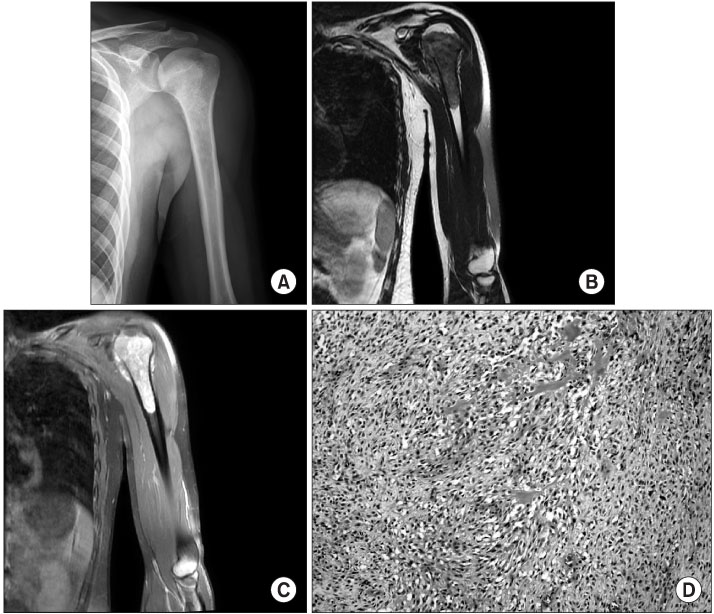J Korean Orthop Assoc.
2011 Apr;46(2):158-161.
Development of Conventional Osteosarcoma after 13 Years Continuous Disease-free Survival of Periosteal Osteosarcoma
- Affiliations
-
- 1Department of Orthopedic Surgery, Korea Cancer Center Hospital, Seoul, Korea. dgjeon@kcch.re.kr
- 2Department of Pathology, Korea Cancer Center Hospital, Seoul, Korea.
Abstract
- Periosteal osteosarcoma is a rare variant of osteosarcoma and has represented 1-2% of all osteosarcomas. Most local recurrences or progression to metastatic disease occurred within the first 3 years after presentation and lung metastasis is more common than bony metastasis. We describe a periosteal osteosarcoma of tibia patient who developed conventional osteosarcoma of proximal humerus after 13 years from the completion of treatment.
Figure
Reference
-
1. Rose PS, Dickey ID, Wenger DE, Unni KK, Sim FH. Periosteal osteosarcoma: long-term outcome and risk of late recurrence. Clin Orthop Relat Res. 2006. 453:314–317.2. Grimer RJ, Bielack S, Flege S, et al. European Musculo Skeletal Oncology Society. Periosteal osteosarcoma--a European review of outcome. Eur J Cancer. 2005. 41:2806–2811.3. Revell MP, Deshmukh N, Grimer RJ, Carter SR, Tillman RM. Periosteal osteosarcoma: a review of 17 cases with mean follow-up of 52 months. Sarcoma. 2002. 6:123–130.
Article4. Jeon DG, Song WS. How can survival be improved in localized osteosarcoma? Expert Rev Anticancer Ther. 2010. 10:1313–1325.
Article5. Goorin AM, Schwartzentruber DJ, Devidas M, et al. Pediatric Oncology Group. Presurgical chemotherapy compared with immediate surgery and adjuvant chemotherapy for nonmetastatic osteosarcoma: Pediatric Oncology Group Study POG-8651. J Clin Oncol. 2003. 21:1574–1580.
Article6. Meyers PA, Heller G, Healey J, et al. Chemotherapy for nonmetastatic osteogenic sarcoma: the Memorial Sloan-Kettering experience. J Clin Oncol. 1992. 10:5–15.
Article



